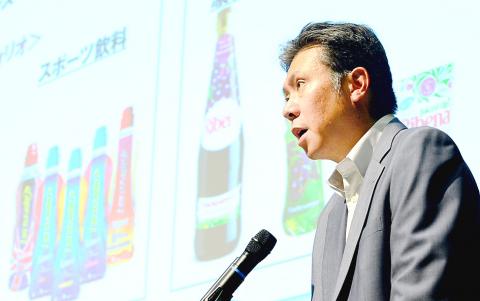Suntory Beverage & Food Ltd agreed to buy the Lucozade and Ribena drink brands from GlaxoSmithKline PLC for US$2.1 billion as the Japanese company reduces reliance on its domestic market.
The transaction is expected to be completed by the end of the year and the proceeds will be used partly to reduce debt, Glaxo said in a statement yesterday at the London Stock Exchange.
Suntory Beverage is preparing to spend as much as ¥500 billion (US$5 billion) on takeovers after holding Japan’s largest initial public offering this year.

Photo: AFP
Glaxo, the UK’s biggest drugmaker, is selling the brands as part of a revamp announced in April to separate older products from its bigger business of developing new medicines.
Lucozade, an energy drink, and Ribena, a liquid concentrate, had combined sales of about US$782 million last year, Glaxo said.
Suntory will acquire global rights to the brands and Glaxo’s Coleford manufacturing site.
Suntory Beverage has said it plans to acquire companies in Southeast Asia, the Middle East, Africa and Latin America to help double sales to ¥2 trillion by 2020.
The Tokyo-based company derived about 31 percent of revenue from overseas markets last year, compared with 25 percent in 2011, according to data compiled by Bloomberg.
The acquisition would allow the Japanese company to expand in countries where the UK company already operates, such as Nigeria and Malaysia, Suntory said.
Suntory Beverage, which sells Boss coffee and Orangina soda, bought 51 percent of PepsiCo Inc’s soft-drink business in Vietnam this year.
Parent company Suntory Holdings, which sells whiskey and beer, remains unlisted.
The beverage group bought France’s Orangina Schweppes Group for ¥300 billion in 2009 and paid US$939 million in the same year for New Zealand’s Frucor Beverages Group.
Suntory Holdings had a 20 percent share of Japan’s non-alcoholic drink market last year, the second-biggest after Coca-Cola Co’s 28 percent, according to Inryosoken, a research company.
Suntory Beverage almost doubled first-half net income to ¥12 billion after it pared costs and sales in Asia rose, the company said on Aug. 6.
Suntory is known for its slogan “Yatteminahare,” or “Go for it,” created by founder Shinjiro Torii.
Actor Bill Murray’s character in the 2003 film Lost in Translation introduced the company to international filmgoers with the line: “For relaxing times, make it Suntory time.”

CAUTIOUS RECOVERY: While the manufacturing sector returned to growth amid the US-China trade truce, firms remain wary as uncertainty clouds the outlook, the CIER said The local manufacturing sector returned to expansion last month, as the official purchasing managers’ index (PMI) rose 2.1 points to 51.0, driven by a temporary easing in US-China trade tensions, the Chung-Hua Institution for Economic Research (CIER, 中華經濟研究院) said yesterday. The PMI gauges the health of the manufacturing industry, with readings above 50 indicating expansion and those below 50 signaling contraction. “Firms are not as pessimistic as they were in April, but they remain far from optimistic,” CIER president Lien Hsien-ming (連賢明) said at a news conference. The full impact of US tariff decisions is unlikely to become clear until later this month

With an approval rating of just two percent, Peruvian President Dina Boluarte might be the world’s most unpopular leader, according to pollsters. Protests greeted her rise to power 29 months ago, and have marked her entire term — joined by assorted scandals, investigations, controversies and a surge in gang violence. The 63-year-old is the target of a dozen probes, including for her alleged failure to declare gifts of luxury jewels and watches, a scandal inevitably dubbed “Rolexgate.” She is also under the microscope for a two-week undeclared absence for nose surgery — which she insists was medical, not cosmetic — and is

GROWING CONCERN: Some senior Trump administration officials opposed the UAE expansion over fears that another TSMC project could jeopardize its US investment Taiwan Semiconductor Manufacturing Co (TSMC, 台積電) is evaluating building an advanced production facility in the United Arab Emirates (UAE) and has discussed the possibility with officials in US President Donald Trump’s administration, people familiar with the matter said, in a potentially major bet on the Middle East that would only come to fruition with Washington’s approval. The company has had multiple meetings in the past few months with US Special Envoy to the Middle East Steve Witkoff and officials from MGX, an influential investment vehicle overseen by the UAE president’s brother, the people said. The conversations are a continuation of talks that

Alchip Technologies Ltd (世芯), an application-specific integrated circuit (ASIC) designer specializing in artificial-intelligence (AI) chips, yesterday said that small-volume production of 3-nanometer (nm) chips for a key customer is on track to start by the end of this year, dismissing speculation about delays in producing advanced chips. As Alchip is transitioning from 7-nanometer and 5-nanometer process technology to 3 nanometers, investors and shareholders have been closely monitoring whether the company is navigating through such transition smoothly. “We are proceeding well in [building] this generation [of chips]. It appears to me that no revision will be required. We have achieved success in designing